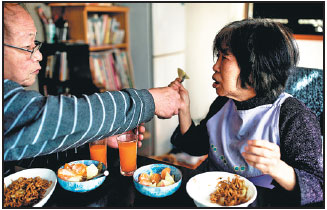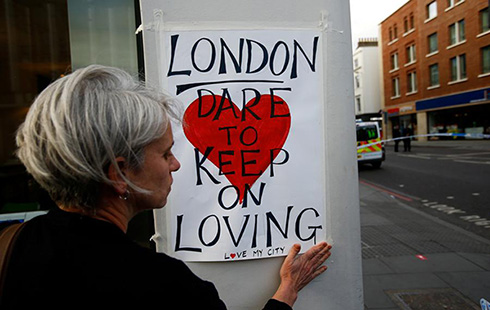Dementia threatens aging Japan with healthcare time bomb
|
Kanemasa Ito feeds his dementia-stricken wife Kimiko, who needs constant supervision, at their house in Kawasaki, Japan.Behrouz Mehri / Agence Francepresse |
KAWASAKI, Japan - Kanemasa Ito compares caring for his wife Kimiko to waging a daily war with the devil. The woman he loved has all but disappeared - lost to dementia, she can no longer eat, bathe, or go to the toilet alone.
"There is a demon inside her head," Ito said, articulating the dramatic change in the person he'd built a life with, while she babbles nonsensically.
One of the world's most rapidly aging and long-lived societies, Japan is at the forefront of an impending global healthcare crisis. Authorities are bracing for a dementia time bomb and their approach could shape policies well beyond its borders.
By 2025, one in five of the over 65s - around 7.3 million people - in Japan will have dementia, the Health Ministry estimates, up from around 4.6 million now.
Alzheimer's disease, a syndrome in which cognitive ability, emotional control and social behavior deteriorate, accounts for the majority of cases.
Ito's wife was just 54 when she was first diagnosed. Now some 15 years on, he is close to breaking point trying to care for her and manage the disease.
No longer able to discern what is harmful from what is safe - Kimiko has previously tried to drink cleaning products, unaware of the hazard of ingesting them - she needs constant supervision.
"It exhausts me," the 73-year-old confessed in an interview at their Kawasaki home.
Their story is becoming increasingly common in a country where a lack of resources and caregivers means the burden falls increasingly on spouses and children.
Prime Minister Shinzo Abe is aiming to increase the number of nursing homes and raise care worker wages to tackle the problem.
Dementia is a major global health issue with cases soaring as people live longer. The World Health Organization estimates a new case is diagnosed every four seconds.
Many developed countries are already facing challenges on how to fund care, but Japan's issue is pronounced because its population has aged at a faster pace.
The overwhelming mental, physical and economic burden of caring for a incapacitated loved one can push people to the brink.
Between 1996 and 2015, there were 754 murder-suicide cases involving family caregivers, mostly men, in Japan, according to a study by Etsuko Yuhara, an associate professor of welfare at Nihon Fukushi University.
Agence France-presse
Ito, who had closed a convenience store he used to run to take care of his wife, said he hopes the government will create a better environment for caregivers.
"Every day is a battle," he said, referring to how Kimiko resists getting dressed in the morning and having her hair washed at night.
He regularly takes Kimiko out for a walk in a nearby park and grocery shopping, but it is hard to know if she is aware of what is happening.
Ito added: "It's really tough to accept."



















